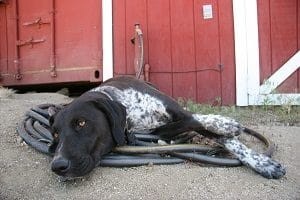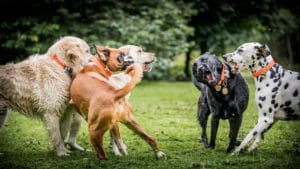Benjamin Franklin was born on January 6, 1705 under the old Julian calendar. When the calendar was changed to our modern Gregorian style in 1752, this date became January 17, 1706.
If Benjamin Franklin were still alive today, he would be celebrating his 307th birthday this month. Among his many accomplishments were inventor, author, printer and statesman. It would be difficult to be reading this article without electricity, and for those who use bifocals it would be twice as difficult.
In his autobiography, Franklin lists his thirteen virtues of life. While not always adhering to them, Ben tried to apply these to his life. But what about dog ownership? Let’s see how we can apply these virtues to our everyday life raising our pups:
Thirteen Virtues
Temperance
“Eat not to dullness; drink not to elevation.” Well, hopefully you are not letting your dog hit the bottle so we can pass on that part of this virtue. Dogs, like many people, tend to overeat.
One reason domesticated dogs overeat is due to boredom. Another reason is instinctual. As pack hunters, a dog in the wild could never be sure of when the next meal was coming, so every chance to eat might be the last for a long time.
No matter the cause, if your dog is chowing down more than he should, get him some exercise with a longer walk and stimulate his mind by playing his favorite games.
Silence
“Speak not but what may benefit others or yourself; avoid trifling conversation.” Is your dog barking too much? Your neighbors giving you dirty looks as you pass them by? Check out our excellent article on this subject.
Order
“Let all your things have their places; let each part of your business have its time.” Routine. Dogs need a routine for daily walks, feeding, etc. Lack of routine can cause stress in dogs, which can lead to destructive behavior.
Resolution
“Resolve to perform what you ought; perform without fail what you resolve.” Learn to be firm with your dog. Ben might have coined a phrase such as “A well-heeled dog is well-healed companion.” Or maybe not.
Frugality
“Make no expense but to do good to others or yourself; i.e., waste nothing.” This can apply to your dog as well, as it’s important to do good but not overindulge and spoil him.

Industry
“Lose no time; be always employ’d in something useful; cut off all unnecessary actions.” Be sure to keep your dog busy with exercise and play. As Ben says, “Laziness travels so slowly that poverty soon overtakes him.”
Sincerity
“Use no hurtful deceit; think innocently and justly, and, if you speak, speak accordingly.” It’s important to reward dogs for good behavior but be sincere about it. Excessive praise may result in the opposite effect.
Justice
“Wrong none by doing injuries, or omitting the benefits that are your duty.” Be sure to admonish your dog immediately after the act. Anything else will only confuse him.
Moderation
“Avoid extremes; forbear resenting injuries so much as you think they deserve.” Taking your dog out of his normal environment can be stressful. For example, a dog not used to being around children suddenly put in a situation with a lot of kids can become traumatized or anxious.
Cleanliness
“Tolerate no uncleanliness in body, cloaths, or habitation.” Does this one really need any further explanation?
Tranquillity
“Be not disturbed at trifles, or at accidents common or unavoidable.” We all need our down time and so do our dogs. Ben may not have coined the phrase “Let sleeping dogs lie” but he’d certainly take it for its word.
Chastity
“Rarely use venery but for health or offspring, never to dullness, weakness, or the injury of your own or another’s peace or reputation.” Yeah, let’s leave this one as it is, but don’t forget to spay or neuter your pets.
Humility
“Imitate Jesus and Socrates.” Well, not sure about imitating Jesus or Socrates but, if anything, this is the virtue that dogs teach us. They show us loyalty, love, devotion, and friendship. If humility isn’t the greatest virtue, what is?











